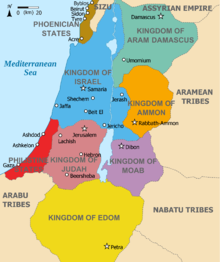Land of Uz

The land of Uz (Hebrew: אֶרֶץ־עוּץ – ʾereṣ-ʿŪṣ) is a location mentioned in the Hebrew Bible, most prominently in the Book of Job, which begins, "There was a man in the land of Uz, whose name was Job".[1]
The name "Uz" is used most often to refer to Uz, son of Aram, presumably the region's namesake. He is mentioned repeatedly in the Bible, in the books of Genesis and 1 Chronicles. It is most often theorized that the Land of Uz is located in either Aram, Edom, or both.
Location
[edit]It has been long debated if Uz is in either Aram or Edom. In the Bible, Genesis 10:23, Genesis 22:21 and 1 Chronicles 1:42 mention Aram, son of Shem, whose firstborn son is named Uz. Thus, Rashi places Uz in Aram.[2] According to the War Scroll, one of the Dead Sea Scrolls, the land of Uz existed beyond the Euphrates, possibly in relation to Aram. In Column 2 verse 11, it is noted, "they shall fight against the rest of the sons of Aramea: Uz, Hul, Togar, and Mesha, who are beyond the Euphrates."[3] Assyrologist K. Lawson Younger has suggested that a possible extrabiblical attestation of Uz might occur in a copy of Esarhaddon's Succession Treaty discovered at Tell Tayinat, which he reconstructs as referring to "the city and land of ˹Usî" in modern-day Syria.[4] Edom was roughly in the area of modern-day southwestern Jordan and southern Israel. Lamentations 4:21 reads: "Rejoice and be glad, O daughter of Edom, that dwellest in the land of Uz." According to the Book of Job, Job lived "in the land of Uz". Jeremiah 25 lists nations including Uz and Edom but not Aram, supporting the identification of Uz with Aram. Job has often been identified as the Jobab mentioned in Genesis 36:33, king of Edom and great-grandson of Esau.[5] It is also possible that there were two locations known as the "Land of Uz", one in Edom and another in Aram.[6]
Other interpretations
[edit]Some scholars hold that Uz is a fictional place to serve the story of Job, rather than a physical land.[7] The word Uz in Hebrew means "counsel" or "advice", which here suggests that this story takes place in the "Land of Counsel". This fits the story, as the remainder of the book is a story about a man named Job who wrestles with his suffering, and is counseled by several men, and ultimately God. A similar conjecture is that if Uz was a physical place, it may have been chosen as the setting for the story due to the meaning of its name.
References
[edit]- ^ Job 1:1
- ^ See Rashi's comment on Job 1:1.
- ^ Vicchio, Stephen J. (2020). The Book of Job: A History of Interpretation and a Commentary. Wipf and Stock Publishers. p. 48. ISBN 978-1-7252-5725-2.
- ^ Younger, K. Lawson (2023). "The Identification of the Deity Aramiš/s and the Locations of Qarnē/Qarnīna and Azaʾi/Aṣî in the Tell Taʿyinat Treaty". Bulletin of the American Society of Overseas Research. 389: 217–234. doi:10.1086/724364. ISSN 2769-3600. S2CID 257684484.
- ^ Reed, Annette Yoshiko (2001). "Job as Jobab: The Interpretation of Job in LXX Job 42:17b-e". Journal of Biblical Literature. 120 (1): 31–55. doi:10.2307/3268592. JSTOR 3268592.
- ^ Younger 2023, p. 229 n. 64.
- ^ Robert Alter, "The Wisdom Books: Job, Proverbs, and Ecclesiastes: a Translation with Commentary", 2010
Text is available under the CC BY-SA 4.0 license; additional terms may apply.
Images, videos and audio are available under their respective licenses.
